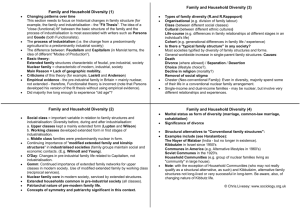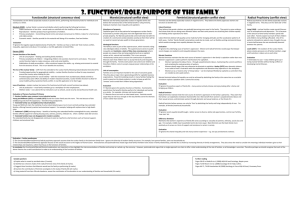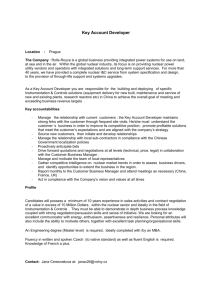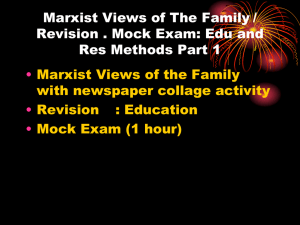Functionalist & Marxist Views on Family: Sociology Notes
advertisement
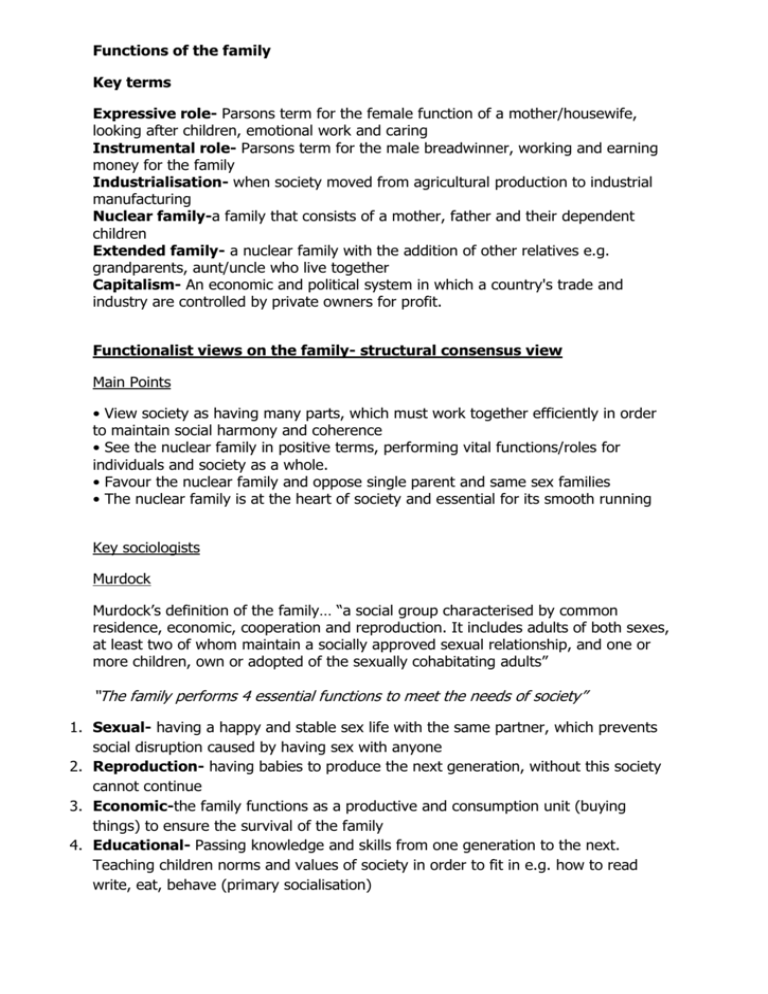
Functions of the family Key terms Expressive role- Parsons term for the female function of a mother/housewife, looking after children, emotional work and caring Instrumental role- Parsons term for the male breadwinner, working and earning money for the family Industrialisation- when society moved from agricultural production to industrial manufacturing Nuclear family-a family that consists of a mother, father and their dependent children Extended family- a nuclear family with the addition of other relatives e.g. grandparents, aunt/uncle who live together Capitalism- An economic and political system in which a country's trade and industry are controlled by private owners for profit. Functionalist views on the family- structural consensus view Main Points • View society as having many parts, which must work together efficiently in order to maintain social harmony and coherence • See the nuclear family in positive terms, performing vital functions/roles for individuals and society as a whole. • Favour the nuclear family and oppose single parent and same sex families • The nuclear family is at the heart of society and essential for its smooth running Key sociologists Murdock Murdock’s definition of the family… “a social group characterised by common residence, economic, cooperation and reproduction. It includes adults of both sexes, at least two of whom maintain a socially approved sexual relationship, and one or more children, own or adopted of the sexually cohabitating adults” “The family performs 4 essential functions to meet the needs of society” 1. Sexual- having a happy and stable sex life with the same partner, which prevents social disruption caused by having sex with anyone 2. Reproduction- having babies to produce the next generation, without this society cannot continue 3. Economic-the family functions as a productive and consumption unit (buying things) to ensure the survival of the family 4. Educational- Passing knowledge and skills from one generation to the next. Teaching children norms and values of society in order to fit in e.g. how to read write, eat, behave (primary socialisation) Parsons functional fit theory “the particular structure and functions of a given type of family will fit the needs of society” Women have an expressive role Men have an instrumental role Nuclear family lost many of its functions when society industrialised- they’ve become a unit of consumption where they buy everything not produce it- family members go to a work place for their employment and the family is hardly ever the employer The family has two main functions:- a) Primary socialisation of children b) Stabilisation of the adult personality (so you can have a stable adult family, parents teach you things for when your older e.g. manners) Warm Bath Theory Parsons describes the family as a ‘warm bath’ as he believes the family helps to relieve stress and tension (e.g. job insecurity, money, deadlines) by washing away his troubles so that he is fresh and ready for the next day at work where he can contribute to society. This helps stabilize adult personalities and make the family members happy Criticisms The nuclear family is not universal Family is not always pleasant as functionalist make it seem Ignores divorce, child abuse and domestic violence Ignores family diversity Functionalist (industrialisation) sociologists Fletcher Industrialisation led to smaller families as people moved away from their parents to see a ‘better life’ People had greater economic independence- had more money don’t have to pay for ill parents Nuclear families became closer- they had closer relationships as there were less people therefore they can spend more time with each other Parsons Parsons distinguishes between two types of family structures:a) The nuclear family b) The extended family According to parsons, there are two types of societies a) Pre-industrial society b) Modern industrial society Features of the pre-industrial and modern industrial societies: Pre industrial society - Extended Family Large family, large number of kin (relatives) and children Labour intensive- put hard work in Production unit- make everything Agricultural society- farming Low technology Modern industrial society- Nuclear Family Small family- fewer children and male breadwinner Machine intensive- reliant on machines Consumption unit- buy everything Industrial society- businesses High technology Parsons argues that the nuclear family fits the needs of an industrial society whereas the extended family fits the needs of the pre industrial society Anderson Studied the 1851 census (who lives in each household) in Preston during industrial times Found 23% extended families due to hardship of working in mills Why they needed an extended family: Absence of welfare state Large number of orphans- parents would die working in mills e.g. hand stuck in machine, dusty air harmful for lungs Cheaper to share rent Mills recruited workers from extended families Laslett Studied parish registers 1564 Found 90% nuclear families Said this was due to the following: Late marriage- had to save up for dowry (money) Short life expectancy- grandparents would die before their grandchildren were born Young and Wilmot Empirical research (proved through observation or experience) in the 1950’s in the East end of London Argue that extended families existed during industrialisation Extended kinship was based on emotional attachment and obligation (responsibility) Also a mutual (shared) support network (various types of help) offering assistance with money, jobs, childcare and advice Argue extended families went in decline during 1960’ Exam question for functionalist view Assess the view that industrialisation led to the decline of the extended family and the rise of the nuclear family (24 marks) Define industrialisation This is a functionalist view Sociologists for this Fletcher- industrialisation did lead to rise of nuclear family as people moved to seek a ‘better life’ Parsons- due to the fact that a certain type of family fits the needs of the society it’s in EVALUATION- Sociologists against this Anderson- during industrialisation 23% of extended families still existed so there wasn’t a total decline Laslett- There was a high number of nuclear families BEFORE industrialisation, so how could industrialisation cause it? Young and Wilmot- extended families existed during industrialisation Marxist argument that the rise of the nuclear family was a deliberate action by the capitalist ruling class, rather than being due simply to industrialisation Other points to consider: Extended families were very popular during pre industrial times Extended families were responsible for the production of food, shelter and clothing Extended families would support each other during difficult times When industrialisation took over extended families were not required as the functions they performed were lost Families had to work for others which meant the economy wanted geographic mobile( must be a small family to easily move not take ill granddad too) workers Nuclear family was best option, can easily move, large family is hard and expensive to move especially older generation Marxist views on the family- structural conflict view Main points Marxists see the family in negative terms and believe the functions/roles of the family benefit the ruling class, helping to maintain class inequality and capitalism. Marxists believe the main role of the family is to serve the interests of the capitalism and bourgeoisie The middle class take advantage of the working class and their labour, they’re used as a tool to make profits Families are a unit of reproduction- Families need to reproduce as it provides the next generation of workers to exploit (make use of) Reproducing children is functional for the capitalist system Families consume goods e.g. Cars, computers etc. As the family supports the capitalist system and perpetuates (keeps it going) the capitalist market economy (if you didn’t buy anything then the bourgeoisie wouldn't make any money) Bourgeoisie (factory owners) get the profit- they use advertisements and the media to convince us to buy things we don’t really need by putting ideas into our heads to keep buying things Women provide free care for the current (husbands) and future (children) workers making them more productive Children are taught to be obedient to the ‘system’ Women provide a cheap reserve army of labour they’re employed when needed by the ruling class (women would be hired during the war as all men would have gone out to fight therefore there were no workers) Women do a ‘triple shift’- paid work, housework and emotional work in the marriage Men needed control over women so there was no doubt over paternity of children as property was passed down- this led to nuclear families Marxists say the family serve capitalism is 4 ways The family socialises children – thereby reproducing both labour power and an acceptance of capitalism (false consciousness). Women’s domestic work is unpaid which benefits capitalism. The family acts as safety valves for the stresses and frustrations of working class men. The family as a unit of consumption buys the goods and services provided by capitalism. Key sociologist Engels Quote from origin of the family, private property and the state “ Modern family is founded on open or concealed domestic slavery of the wife” (quote from Engels book) Engels is saying that housework is slavery of wives, slaves do not get paid for their work and neither do housewives therefore it is slavery Engels believed the means of production were communally owned, this era of primitive communism was characterized by promiscuity, there were no rules limiting sexual relationships and the society itself was the ‘family’ The monogamous nuclear family originated according to Marxists from the inheritance of private property, men needed to be sure that they had legitimate (lawful or rightful) heirs Throughout history more restrictions were placed on sexual relationships, more monogamous nuclear families developed to save the problem of the inheritance of private property- men needed control over women so that there was no doubt over paternity of children when property is passed down .... this led to nuclear families Therefore the family is designed to control women and protect property Zarestsky Zarestsky claimed the family props up capitalism Working class men have power in their home and this can relieve their frustration at being exploited at work The family is one place where male workers can feel they have power and control. This helps them accept their oppression in wider society. (Controlling their wives/children at home helps them relive stress from work where they have no control) Marcuse Claimed that working class families are encouraged to purchase false needs in the form of the latest consumer goods, which he said, served the interest of capitalism rather than the consumers’, as it stimulated the economy and kept workers distracted from seeking equality and justice. Criticisms of Marxists Negative about the family- sees it as exploitive Marxists assume that the nuclear family is dominant in capitalist society Functionalists argue that Marxists ignore real benefits of the family for its members such as intimacy(closeness/relationship) and support Exam question for Marxist view Assess the Marxist view that the main role of the family is to serve the interests of capitalism. (24 marks) Define capitalism Write about the Marxist view of the family EVALUATION Compare with functionalist view of the family Compare with feminists view of the family Feminists view on the family-structural gender conflict view Feminists see the family (especially nuclear) in negative terms as it exploits and oppresses women The root cause is patriarchy (male dominated) The purpose of the family is to reinforce the dominant position of men within a patriarchal society. 1st type:: Marxist feminists – because of capitalism money Patriarchy is caused by the capitalist system Exploitation of women leads to the success of the capitalist system Marxist feminists believe full equality can only be achieved by abolishing the family at the same time as replacing capitalism with a communist society. Sociologists Barrat and McIntosh The nuclear family is presented as the ideal Other families are inferior (lower) The state will stereotype and scapegoat alternative families (e.g. they will blame single parent families for crime etc.) 2nd type:: Radical (extreme) feminists- because of male power They believe patriarchy oppresses women Patriarchal ideology leads to the tyrannization (ruling/power) of women and children in the family. Men dominate women through domestic and sexual violence or the threat of it Rape and assault are evidence of this Men exploit and benefit from women’s unpaid domestic labour The family exploits women and functions to benefit men Radical feminists believe women can only be ‘free’ by abolishing the family and living independently of men. For example, all female (matrifocal) households. 3rd type:: Liberal (open minded) Feminists Patriarchy is caused by cultural attitudes and discriminatory laws e.g. birth law or contraception laws Norms and values are reinforced by family and other institutions Relationships between men and women becoming more equal due to legal changes such as equal pay act 1970 and sex discrimination act 1975 Rape within marriage is illegal Equality can be achieved through social policies which are family friendly e.g. flexible working hours and extended paternity leave which would encourage more equality between the two sexes Evaluation/criticisms of feminists view on the family Doesn’t explain the subordination (inferior or lower) of women in pre capitalist societies (Marxist) Portrays women as passive (accept or allow things) but women can make changes and improve their situation e.g. the suffragettes who fought for the right of women to vote Doesn’t acknowledge that power can be shared Ignores the positive aspects of family life – many women actively choose and enjoy looking after a home and bringing up children. Doesn’t look at single parent or gay relationships Doesn’t look at different ethnic groups e.g. black women Doesn’t explain why marriage and cohabitation are still popular New Right views on the family Assumes the nuclear family is ideal Shares the functionalist view that the stability of the family is important for society Supports clear cut roles e.g. male breadwinner Believe in two groups the New Rabble (underclass-reliant on gov, high crime etc) and New Victorians (traditional family) Criticise changes to social policy and changes in society which have resulted in the growth of abnormal family and household types Believe the welfare state is leading to a culture of dependency and eventually the society will only depend on the government Single mothers are condemned (destined) and held responsible for problems such as crime and poverty Breakdown of morals and values In the family have led to crime within society The role of the family is to teach children the difference between right and wrong, and to provide a sense of morality more widely known as ‘family values.’ 1st New Right Sociologist Charles Murray The traditional nuclear family is under threat Visited the UK in 1989 to investigate the following >> ‘is this country developing a USA style underclass?’ (underclass=people who’ve never been employed before) He found an increase in illegitimacy, cohabitation and divorce Welfare benefits are too high and are creating a culture of dependency There is an ‘underclass’ caused by single parents consisting of people in a society who live only from benefits and make no effort to find a job or go out to work and commit crimes and become pregnant at an early age 2nd New Right sociologist Paul Johnson Wrote about ‘the malaise (depression/illness eating away the British life) affecting British life’ and gave an example of a mother with 11 children who was given 3 council homes worth £196,580 which is equivalent to 60 peoples taxes for a year Evaluation/criticisms of New Right view on the family Puts forward a romantic view of the family life Is historically superficial- rates of illegitimacy have been high in the past Ignores the ‘dark side’ of the family Has a narrow (constricted) view Terms ‘New Victorians’ and ‘New Rabble’ are emotive and lack credibility Policies have been criticised for blaming and punishing the victims of social problems e.g. single mothers Post modernists view on the family- after the modern era/what society is like in the modern times There is a much wider range of living opportunities available nowadays due to social and cultural changes Society is not predictable anymore, there is no dominant family type Families are now less stable therefore function differently in Postmodern societies There are fewer nuclear families and more diversity in families e.g. more same sex couples, cohabiting, single Judith Stacey No assumptions on what is the best or normal type of family- it could be any type of family There is uncertainty, insecurity and doubt- people are doubting themselves they don’t know what family type they should be New family types function differently General critical views of the family Laing Studied schizophrenia The family can damage an individual Parents extend the dependence of children-parents cling onto children so they don’t feel lonely, gives them more responsibilities Criticisms Doesn’t account for the role of siblings, teachers, media etc Blamed it all on the family especially parents Cooper Family relationships can cause stress, guilt and violence Family relationships form a ‘love trap’ not able to be ourselves- children behave different at home as parents make you feel guilty that you must do housework-whereas with friends we can act how we like don’t have to act a certain way Criticisms Like Laing he only looked at schizo Only looked at western societies
